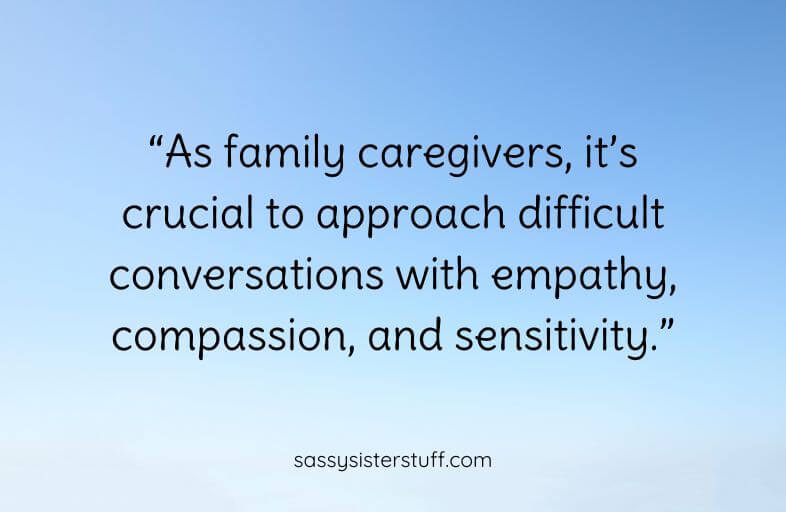8 Things NOT to Say to Your Aging Parents
Caregiving for older parents can be one of the most rewarding yet challenging roles an adult child takes on. This is a role many women face in midlife.
Whether you’re navigating safety concerns, discussing home care services, or helping with important decisions like moving to a senior living or assisted living facility, the role of family caregiving often requires delicate conversations.
As family caregivers, it’s crucial to approach these conversations with empathy, compassion, and a sensitive approach.
Words matter—what you say (and how you say it) can either strengthen your relationship or create unnecessary tension. Different ways of framing your thoughts can make all the difference in ensuring your parents feel respected and supported.

In this article, we’ll explore eight things you should avoid saying to your aging parents. Along with these examples, we’ll provide communication tips to help you navigate challenging conversations and everyday life with compassion and care.
So let’s dive into how you can foster open and respectful dialogue while supporting your parents’ needs.
8 Things Not to Say to Your Aging Parents
I have been a caregiver to both of my parents and learned (first hand) how sensitive older people can be when it comes to difficult conversations.
But I am extremely thankful for the amount of time that I got to spend with them prior to their passing, and that I learned to ask open-ended questions about my family history. Once they were gone, that history was gone forever.
I also learned how to negotiate issues with them rather than demand; I learned how to find middle ground on some issues and let other issues go.
But most importantly, I learned how to communicate effectively with them in a sensitive, compassionate manner. It preserved our relationship and allowed us to make better decisions together.
Below, you’ll find 8 things not to say to your aging parents, but you’ll also find alternatives that will cause less frustration for everyone.
Remember, your elderly parents are dealing with normal age-related cognitive decline and also still see you are their “child.” It’s difficult for them to understand things from your perspective.

1. “You Already Told Me That.”
It’s common for older adults to repeat stories or details—sometimes due to memory issues, other times because they genuinely enjoy reminiscing.
While it may seem harmless to point out that you’ve heard the story before, saying “You already told me that” can come across as dismissive, even if that’s not your intention.
For your parent, sharing memories might be a way of seeking connection, processing emotions, or simply engaging in conversation.
Why It’s Harmful
When you interrupt or point out repetition, your parent may feel embarrassed, forgetful, or like they’re “losing it.” Over time, this could make them hesitant to open up to you about other things, including important concerns. It also negatively impacts family dynamics and relationships.
A Better Approach
Instead of focusing on the repetition, try to stay engaged. Respond as though it’s the first time you’ve heard the story.
Ask follow-up questions like, “What happened next?” or “How did that make you feel?” These small actions show respect and genuine interest, which can strengthen your relationship.
If you’re feeling overwhelmed by hearing the same stories, it’s okay to redirect gently. For example:
- “I love hearing about those days—what else do you remember about that time?”
- “That reminds me of when we did [shared memory]—what do you remember about it?”
Key Takeaway
Your aging parent’s need to share isn’t just about the story; it’s about connection. Responding with patience and care helps nurture the bond between you, even if you’ve heard the story a dozen times.

2. “You Can’t Do That Anymore.”
As your parents age, there may be activities or tasks they struggle with more than they used to. It’s natural to want to protect them from harm, but outright saying, “You can’t do that anymore” can feel like you’re taking away their independence.
For many aging parents, maintaining a sense of autonomy is crucial to their dignity and mental well-being.
Why It’s Harmful
Hearing that they’re “not able” to do something may feel like a judgment on their capabilities or worth. It can lead to frustration, resistance, or even a sense of hopelessness.
Nobody wants to feel like they’re losing control over their own life, especially as they grow older.
A Better Approach
Instead of focusing on what they can’t do, encourage them to explore alternatives or adapt activities to their current abilities. For example:
- If they struggle with driving, suggest, “How about I drive us to the store, and we can run errands together?”
- If they’re finding household chores difficult, say, “Would you like some help with this? We can make it easier together.”
When it came time for my father to stop driving, I suggested that I follow him home from our house one evening.
We made a deal that if I didn’t observe any concerns like crossing lines, driving too slow or fast, or rolling stops, then he could keep driving. But we would evaluate the situation together when we got to his house.
This was just one of many major life transitions for my dad because he was a Drivers Education Teacher for 20 years. But we had to gently and respectfully convince him it wasn’t a good idea for him to keep driving at age 85.
These small shifts in language and approach show that you’re on their side and looking for solutions, not trying to limit them.
Key Takeaway
Acknowledge and respect your parents’ desire to remain active and independent. Framing your support in a collaborative way—focusing on what they can do—empowers them and helps maintain their confidence. Focus on maintaining your parents’ quality of life when these issues come up.

3. “That’s Not How You Should Feel.”
When your aging parent expresses sadness, frustration, or fear, it might be tempting to reassure them by saying, “That’s not how you should feel.”
However, dismissing their emotions can make them feel unheard or invalidated. Aging comes with unique challenges—health problems, loss of independence, or grief over life changes—that can create complex emotions. Insensitive conversations only make matters worse.
Why It’s Harmful
Telling your parents how they should feel minimizes their experience and can unintentionally close the door to meaningful communication. They may start bottling up their feelings, leading to increased stress or even depression.
Emotional well-being is a key part of healthy aging, and open conversations are essential for their mental health.
A Better Approach
Validate their emotions, even if you don’t completely understand or agree with them. Phrases like, “I can see why you feel that way” or “That sounds really hard” can go a long way in showing empathy. Once they feel heard, gently shift toward problem-solving or offering support. For example:
- “I understand this has been upsetting—what can we do to make it better?”
- “It sounds like this has been bothering you. I’m here to help however I can.”
If their feelings persist or seem overwhelming, encourage them to talk with a professional, like a counselor or therapist. Emotional support networks, whether family, friends, or professionals, play a vital role in healthy aging.
Key Takeaway
Your role as a caregiver isn’t to fix every problem but to listen and offer support. Acknowledging your parent’s feelings helps develop a respectful relationship and builds trust, making it easier to navigate the emotional challenges of caregiving together.

4. “It’s Time to Move Into an Assisted Living Facility.”
Talking to your aging parents about senior living options, such as an assisted living facility, can be one of the most emotionally charged conversations you’ll have as a caregiver.
While your concerns about safety or home care services may be valid, saying, “It’s time for you to move into assisted living” without thoughtful discussion about the possibility can feel abrupt and dismissive of your parent’s preferences.
Fortunately, I never had to do this with my parents because I was going to remain their primary caregiver, but I have friends who had to face this option, and it needed to be handled carefully.
Why It’s Harmful
Your parent may interpret this statement as a loss of independence or a sign that you no longer want to care for them.
It can also create feelings of fear, rejection, or resentment. Older adults often feel a strong attachment to their home and the memories tied to it, making the idea of moving particularly difficult.
A Better Approach
Start by acknowledging your parent’s feelings and perspective. For example:
- “I know how much you love your home, and I want to respect that.”
- “Your safety and happiness are really important to me, and I think we should explore some options together.”
Presenting the move as a collaborative decision rather than a mandate can reduce resistance and help them feel included in the process. Share your concerns honestly but kindly, focusing on their well-being:
- “I worry about you being alone here if something happens. Can we talk about what would make you feel most comfortable and secure?”
If the topic is particularly sensitive, explore alternatives first, such as in-home care or community programs, to show that you’re considering all possibilities.
But don’t have these conversations when you’re in a hurry. Make sure you have plenty of time to thoroughly share your concerns and listen to theirs.
Key Takeaway
When addressing senior living or assisted living options, remember that patience and a sensitive approach are key. Your goal is to support your parents in making a transition that feels right for them while ensuring their safety and quality of life.

5. “Why Didn’t You Tell Me Sooner?”
When your aging parent finally opens up about a problem or concern, it can be frustrating to realize they’ve been dealing with it on their own for some time.
Your first instinct might be to ask, “Why didn’t you tell me sooner?” However, even if it’s unintended, this question can sound accusatory and make them feel defensive or guilty for not speaking up earlier.
Why It’s Harmful
Older adults might hesitate to share their struggles due to embarrassment, fear of being a burden, or uncertainty about how you’ll react.
Phrasing your response this way can discourage future openness and reinforce their reluctance to seek help. Instead of fostering trust, it creates an atmosphere of judgment or blame.
A Better Approach
Focus on acknowledging their courage in sharing with you and reassuring them that you’re there to help. For example:
- “Thank you for letting me know. I’m so glad you told me.”
- “Let’s figure out how we can handle it together.”
Once you’ve expressed support, gently ask questions to better understand the situation without making them feel interrogated:
- “What’s been going on, and how can I help?”
- “How long have you been feeling this way? I’d like to help find a solution.”
By creating a safe and compassionate space for these conversations, you build a stronger foundation for future communication.
Key Takeaway
Your response to a difficult disclosure sets the tone for future conversations. Replace blame with reassurance, and show your parent that their trust in you is well-placed. Together, you can tackle challenges as a team.

6. “I Told You So.”
When your aging parent faces the consequences of a decision that you warned them about, the temptation to say “I told you so” might arise. However, while you may feel justified, this statement is usually more hurtful than helpful.
I’ve had to bite my tongue several times when my mother-in-law has been scammed because she didn’t listen to us about making purchases from illegitimate sources. But I knew it would do no good to antagonize the situation and make her feel worse.
Why It’s Harmful
“I told you so” can come across as condescending and dismissive of your parent’s feelings. Instead of providing the support and understanding they need, it can create an emotional barrier and make your parent feel ashamed or frustrated.
At a time when they’re already dealing with the consequences of their actions, the last thing they need is to feel belittled.
A Better Approach
Instead of focusing on the “I told you so” moment, offer a compassionate, problem-solving approach:
- “I know this situation is tough, but we’ll figure out how to move forward together.”
- “Let’s work on finding a solution so this doesn’t happen again.”
Encourage collaboration in addressing the issue. You could say something like:
- “What can we learn from this, and how can we handle things differently in the future?”
- “I’m here to help, and together we can find a way to make things easier.”
By offering a solution-oriented mindset, you foster a sense of partnership and prevent unnecessary resentment.
Key Takeaway
While it might be tempting to say “I told you so,” this phrase does more harm than good. Focus on how you can help your parent resolve the issue, learn from it, and move forward together, rather than reinforcing past mistakes.

7. “You’re Just Being Difficult.”
When your aging parent is resisting help or pushing back on a decision, it can be frustrating. You may be tempted to say, “You’re just being difficult,” but labeling them this way only escalates tension and damages trust.
Why It’s Harmful
Telling your parents that they’re being difficult can feel like an attack on their character, not just their behavior. It can create defensiveness and feelings of frustration, making it even harder to have a productive conversation.
The reality is, their resistance may be rooted in fear, anxiety, or confusion, and labeling them as “difficult” dismisses these emotions.
A Better Approach
Instead of resorting to judgment, take a step back and practice patience. Try to understand the underlying reasons for their resistance. For example:
- “I can see this is really hard for you. Can you help me understand what’s making you feel this way?”
- “I want to make sure you’re comfortable with this, so let’s talk it through.”
By approaching the situation with empathy and a willingness to listen, you open the door for more honest communication. You might uncover fears or concerns your parent hasn’t voiced yet, which will help you find a solution that works for everyone.
Key Takeaway
Instead of labeling your parent as “difficult,” focus on understanding their perspective. With patience and a compassionate approach, you can de-escalate tension and move toward a solution that respects both of your needs.

8. “I Don’t Have Time for This Right Now.”
When your aging parent needs your help but you’re feeling overwhelmed, it’s easy to fall into the trap of saying, “I don’t have time for this right now.”
However, while this may be a reflection of your stress, it can make your parent feel like a burden, which only worsens the situation.
Why It’s Harmful
Hearing “I don’t have time for this right now” can leave your parent feeling rejected and unimportant. They may already feel like they’re asking for too much, and this statement only confirms those fears.
Even if you are truly overwhelmed, your response can impact their emotional well-being and the trust between you. Whenever possible, schedule time with your parents so you don’t feel stressed and can spend quality time with them.
A Better Approach
Instead of shutting down the conversation entirely, set boundaries in a way that shows respect for both your time and your parent’s needs. For example:
- “I’m feeling a bit overwhelmed at the moment, but I want to help. Can we talk about this in an hour?”
- “I can’t give you the attention you deserve right now, but let’s make sure we find a good time to discuss this later.”
This approach shows that you acknowledge their needs and care about addressing them, even if you’re not able to at that exact moment.
You’re also prioritizing future communication and offering a solution instead of just shutting them down.
Key Takeaway
While you might feel rushed, it’s important to communicate your boundaries with kindness. Let your parents know that you do want to be there for them but need a better time to focus.
This approach shows that you value both their needs and your well-being, fostering a more balanced and compassionate relationship.

Final Thoughts about Things Not to Say to Your Aging Parents
I hope you have found these thoughts helpful. I’ve learned that adult children often find it challenging to deal with parents who may be experiencing Alzheimer’s disease or other cognitive impairments, chronic health conditions, general memory loss, chronic health conditions, and other issues that you must learn to deal with as a primary caregiver.
For additional resources, you should check out the National Institute on Aging. They have extensive materials to support family members who are taking care of elderly parents.
You can explore respite care, a geriatric care manager, support groups for you and your parents, a professional caregiver, social workers, and even an independent living community if it becomes necessary for your aging family member.
Try to enjoy your parents with compassion and a little understanding—from a place of love. Spending time with them is the greatest gift you can give them, and yourself. But you may not realize it until it’s too late.
You may find these Related Articles helpful:
- Strategies for Navigating Family Dynamics in Caregiving
- 7 Things NOT to Say to Someone with Dementia
- How to Avoid Arguing with Elderly Parents
- 21 Tips for Dealing with Irrational Elderly Parents
Love to ALL! ~ Susan







